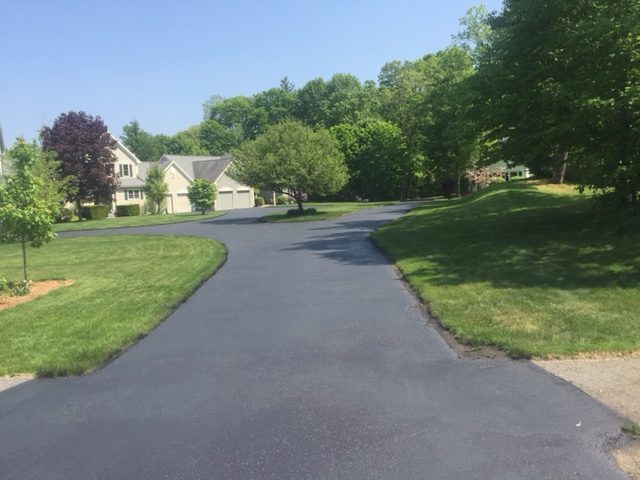Lasting Results: Asphalt Patch Repair Through Accuracy Sealing
Lasting Results: Asphalt Patch Repair Through Accuracy Sealing
Blog Article
Cold Mix Asphalt Vs. Hot Mix Asphalt: Which Is Right for You?

Structure Differences
Cold mix asphalt is created by emulsifying the asphalt binder with water and an emulsifying representative prior to blending it with aggregate. The hot mix asphalt production process includes heating up the aggregate and asphalt binder independently before combining them at the asphalt plant.
Additionally, chilly mix asphalt has a tendency to be less dense and much more flexible than hot mix asphalt. This flexibility makes it better matched for locations with greater degrees of motion, such as driveways or roads with heavy traffic. In contrast, warm mix asphalt is recognized for its high longevity and resistance to rutting and cracking, making it a recommended selection for highways and high-traffic roads where longevity is crucial.
Installment Refine Variations
The process of mounting cold mix and hot mix asphalt shows significant variations in their needs and procedures. Cold mix asphalt, being a more adaptable material, can be applied straight from the bag or container onto the pothole or harmed area. It requires marginal preparation job, such as cleaning the location and compacting the chilly combine with hand devices. This makes it a convenient option for fast and short-term fixes. In comparison, hot mix asphalt demands a much more fancy installment process. It entails heating up the mixture to high temperature levels before laying it down on a properly prepared base. The prep work includes condensing the base, applying a tack layer, and making use of heavy equipment like pavers and compactors for a smooth and long lasting surface. As a result of the heating needs, hot mix asphalt setups are generally performed by professionals with specific tools, guaranteeing a much more irreversible and structurally sound result.
Durability and Long Life Factors
When thinking about asphalt choices, toughness and long life are critical variables to review for long-term sidewalk efficiency,. Warm mix asphalt (HMA) is understood for its outstanding longevity and long life. The heats during the laying and mixing procedure enable far better compaction, leading to a denser and stronger pavement framework. This causes HMA being a lot more resistant to heavy traffic lots, extreme weather condition conditions, and the effects old contrasted to cold mix asphalt (CMA)
In regards to durability, HMA generally outperforms CMA as a result of its exceptional strength and resistance residential or commercial properties. HMA sidewalks have a longer life span, requiring much less frequent repair services and maintenance, which can convert to cost financial savings over time. Additionally, HMA sidewalks are a lot more quickly customizable to satisfy specific job requirements, additionally enhancing their toughness.
Cost Factors To Consider
Taking into consideration the economic effects is a crucial aspect when evaluating the choice in between warm mix asphalt (HMA) and cool mix asphalt (CMA) for sidewalk jobs. While the preliminary expense of hot mix asphalt is generally higher than that of cold mix asphalt, HMA usually provides a much more cost-effective remedy in the lengthy run due to its premium toughness and long life.
In addition to product costs, it's crucial to think about the expenditures connected with installment and maintenance when contrasting HMA and CMA. Ultimately, the decision in between HMA and CMA must take right into account not simply the preliminary expense yet additionally the long-term monetary effects click to investigate to identify the most cost-efficient choice for the details pavement job.
Environmental Effect Contrast
Comparison of the environmental effects between hot mix asphalt (HMA) and cold mix asphalt (CMA) reveals distinct differences in sustainability practices. HMA production requires high temperatures, leading to increased power intake and greenhouse gas exhausts.
In addition, the usage of CMA often entails recycling existing asphalt sidewalk, advertising source preservation and lowering the quantity of waste sent out to land fills. This reusing element even more enhances the sustainability of CMA compared to HMA. On the whole, their explanation when taking into consideration the ecological effect, CMA becomes a more environmentally lasting option due to its reduced power demands, reduced exhausts, and the capacity for recycling existing products. By choosing CMA over HMA, road construction tasks can add positively to environmental preservation efforts.
Conclusion
Finally, the selection between chilly mix asphalt (CMA) and warm mix asphalt (HMA) depends on different factors such as structure, installment procedure, sturdiness, longevity, cost, and ecological influence. angle parking. While CMA uses a fast and affordable solution for minor repair services, HMA makes certain superior durability and longevity for rush hour locations. Consider these elements very carefully to establish which type of asphalt is the best option for your paving needs

Taking into consideration the financial ramifications is a crucial element when reviewing the choice in between warm mix asphalt (HMA) and cold mix asphalt (CMA) for pavement tasks. While the first cost of hot mix asphalt is commonly higher than that of chilly mix asphalt, HMA commonly provides a more economical remedy in the long run due to its exceptional toughness and long life. cold mix asphalt.Comparison of the ecological influences in between warm mix asphalt (HMA) and cold mix asphalt (CMA) reveals distinct differences visit our website in sustainability methods.In verdict, the selection in between cool mix asphalt (CMA) and warm mix asphalt (HMA) depends on various factors such as composition, setup process, resilience, durability, expense, and environmental effect
Report this page